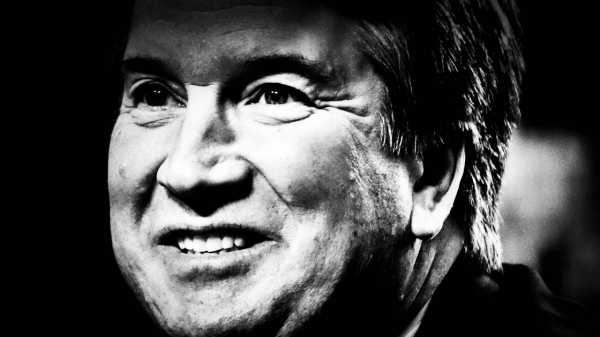
Last week, after Christine Blasey Ford went public with an allegation that Brett Kavanaugh sexually assaulted her at a party in high school, the Yale Daily News published an old photograph that directed scrutiny to the Supreme Court nominee’s college years. In the black-and-white image, two brothers of the Delta Kappa Epsilon fraternity march across Yale’s campus in an initiation rite, one of them carrying a flag fashioned from women’s lingerie.
At the time of the shot, Kavanaugh, who does not appear in the image, was a sophomore in the fraternity. Another man who was a member of DKE at the time told the student paper, on Wednesday, that his brothers had obtained the underwear “consensually.” But several female classmates suggested otherwise, saying that members of DKE often attempted to ransack their rooms during class time. “They were loud, entitled, pushy, and creepy,” one alumna tweeted. “They didn’t care what we thought.” On Sunday, the portrait of Kavanaugh’s time at Yale came into sharper focus, when The New Yorker reported that Democrats are investigating a new allegation against him by a college classmate, Deborah Ramirez, who claims that, when they were both Yale freshmen and inebriated at a dorm-room party, Kavanaugh exposed himself and thrust his penis in her face. (Kavanaugh has denied both her allegation and Ford’s.)
DKE, usually pronounced as a single syllable, rhyming with “reek,” was founded at Yale in 1844. It is one of the oldest fraternities in the nation, with chapters on more than fifty college campuses. Since Kavanaugh’s time at Yale (where he also belonged to an all-male secret society, Truth and Courage, which was popularly known as Tit and Clit), the prevalence of Greek life on the campus has declined, but DKE, sometimes described as the “white football frat,” has maintained a reputation for aggressively loutish antics. “When we had a mixer with them, they didn’t even want to talk to us,” a classmate who is in a sorority told me recently. “They just wanted to pour beers on each other’s heads.”
I am currently a senior at Yale. When my class arrived, in the fall of 2015, DKE was a dormant presence on campus. It operated mostly outside university bounds because of penalties it had incurred after a now infamous incident five years prior, when a pack of pledges thronged the freshman residential quadrangle to shout an initiation chant: “No means yes, yes means anal.” (Also: “Fucking sluts!” and “I fuck dead women and fill them with my semen.”) Soon after, sixteen students and alumnae filed a complaint with the Department of Education’s Office for Civil Rights. The Yale College Executive Committee convened for months, and then issued a five-year ban on the fraternity, forbidding it from conducting activities on campus or using university e-mail to advertise events. To many students, the length of the sanctions seemed harsh. Yale’s administration generally prefers to adjudicate disciplinary infractions as individual cases rather than holding entire student groups accountable. Jonathan Holloway, who was then the dean of the college, told the Yale Daily News that he hoped a five-year ban at a four-year university could help DKE to “flush institutional memory and culture out.”
In the years since Yale lifted the restrictions on DKE, in 2016, the fraternity has experienced a turbulent return to campus life. In January, Business Insider published detailed accounts from two female undergraduates who alleged that they had been assaulted by DKE brothers. One of the accused was a former president of the fraternity, who, in 2016, told the student paper that DKE members of his generation had “played an important part in the cultural shift” that had occurred since the 2010 incident. (He was eventually expelled from the fraternity and suspended from Yale, for “penetration without consent”; in a statement to the Yale Daily News at the time, he said of the victim, “Though I deny many of the claims made, I respect this person and hope that she can find the same peace that I hope to find.”) Further investigation by the Daily News uncovered eight more women who alleged sexual misconduct by DKE brothers between 2014 and 2017. (None of these women filed formal Title IX complaints.)
As the university prepared an investigation into DKE’s transgressions, the Yale chapter of the fraternity released a set of guidelines designed to foster a “safer and more welcoming environment.” They would deputize co-ed bouncers and so-called sober monitors to maintain safety standards at gatherings. Water coolers would remain filled. Three-second pauses between songs would better allow guests to “avoid uncomfortable interactions.” At the same time, DKE quieted down. Few female sports teams, and fewer sororities, agreed to mix with them. The fraternity refrained from advertising parties, seeming to sense that it might have trouble attracting guests, though it continued to host an annual celebration known as Tang, a raucous and muddy affair held after classes ended each spring. This past year, hundreds of students signalled on Facebook their plans to attend, but similar numbers gravitated toward a rival event hosted by Engender, a student group that advocates for greater inclusion in fraternities. Engender brainstormed a hashtag—#boycottDKE—and sent activists to distribute safety flyers outside the fraternity’s houses. “In the wake of campus conversations about supporting survivors and denouncing sexual misconduct, partying is political,” the group wrote on a Facebook page for the event.
This summer, DKE lost its lease on the pair of buildings it has occupied for more than two decades. The fraternity’s real-estate manager, himself an alumnus of Yale, told the student paper that the decision not to renew was a consequence of years of disruptive behavior and complaints of misconduct. Many current students cheer, and others lament, that “DKE is dead.” (In an e-mail, Doug Lanpher, DKE’s national executive director, told me, “We do not tolerate sexual misconduct in any form. Any member who is found responsible for violating Title IX rules on sexual misconduct is immediately removed from the chapter.”) The demise of DKE on Yale’s campus is just one sign that the “horseplay” typical of fraternity life has become increasingly incompatible with many of the values—of safety, equality, inclusion—toward which most modern universities strive. Many of my peers, though suspicious of DKE, find it no more hostile than other fraternities at Yale. In 2015, for instance, Sigma Alpha Epsilon (since rebranded as Leo), faced accusations of turning away students of color from a party and repeatedly shouting, “White girls only.” That fraternity, much like DKE, had previously been banned from campus as a punishment for violating the university’s sexual-misconduct policy at an initiation ceremony and then trying to impede the resulting investigation.
On Monday, some classes at the Yale Law School were cancelled to allow students to protest Kavanaugh’s nomination. Hundreds of law students travelled to D.C. Others remained in New Haven to mount a local demonstration. For many, the topic feels personal: one of the law school’s top professors, Amy Chua, has been accused of coaching female students on their appearances to help them win clerkships with Kavanaugh. (Chua has called the claims “100% false.”) Her husband and colleague at the law school, Jed Rubenfeld, is the subject of an ongoing internal investigation at Yale, whose details are confidential. (“For some years, I have contended with personal attacks and false allegations in reaction to my writing on difficult and controversial but important topics in the law,” Rubenfeld told the Guardian. “I have reason to suspect I am now facing more of the same.”) By the afternoon, a dozen or so demonstrators still lingered in the law school’s main hall, wearing black as a sign of solidarity and drinking coffee from paper cups. “I would say that this community feels very strongly that Kavanaugh should not be confirmed under these circumstances,” one told me.
Among undergraduates, reactions have been more subdued. “People here grapple constantly with this place’s legacy of untouchable rich white dudes from prep school,” Alexa Derman, a senior, told me. When the news reveals that one such dude “might have been a creep at Yale,” she added, “it doesn’t shatter any illusions.” On Monday, an open letter from alumnae who stand in support of Ramirez—and Ford—began to circulate online. “We are coming forward as women of Yale because we have a shared experience of the environment that shaped not only Judge Kavanaugh’s life and career, but our own,” it said.
During her freshman year, Derman lived one floor above the suite where Ramirez alleges that Kavanaugh exposed himself. “I know the layout of that room,” she said. “It’s really strange. It feels almost so close that I don’t want to touch it. And, obviously, it makes you wonder, What would people say about me? Will people say I’m credible in twenty years, if something happens?” On Sunday, Derman wrote on Twitter that it’s easy to forget, in an “insular” place such as Yale, that, when students who behave badly graduate, “they don’t disappear but instead become part of the fabric of society, & a certain type ascends & ascends.” It’s “been unbearable at times to watch men I know have hurt my friends ascend within clubs to leadership,” she continued, adding, “How will we feel seeing which of them rise in their fields, our fields, invincible & untouchable?”
Brett Kavanaugh, like many men of his generation, is a product of an era in which fraternities were incubators of ambition. Five American Presidents, including the Yale alumni George H. W. Bush and George W. Bush, once belonged to DKE. (In the satirical biopic “W.,” about the life of the younger Bush, the head of the fraternity is shown telling incoming freshmen, during a beer-drenched initiation ritual, “Delta Kappa brothers are men of honor, decency, and God-given character. That, along with our family fortunes, is why we rule the world.”) This reality, too, may be changing. Two years ago, Harvard made the historic and controversial decision to penalize single-gender social clubs and Greek organizations by banning their members from serving as the captains of athletic teams, leading official student groups, or receiving the university’s endorsement for top postgraduate fellowships such as the Marshall and Rhodes. Yale’s college dean, Marvin Chun, has established a committee to advise him on the regulation of campus social life, but has so far taken no similar steps. (“We have students who say we should be like Harvard, and we have many students who say we should not be like Harvard,” Chun told the Yale Daily News, earlier this year. “I have not formed an opinion strongly. I’m in listening mode.” In an e-mail on Tuesday, Chun told me, “We haven’t reached any decisions regarding Yale’s policies.”) Some of my classmates who are in DKE, particularly the seniors, now distance themselves from the fraternity, admitting that being a member is a “bad look.” It is not hard to imagine a future in which membership in such a community—even one that purports to champion, as DKE does, “the gentleman, the scholar, and the jolly good fellow”—is not an asset but a liability. We will find out this week, as the Kavanaugh hearings proceed, how near that future might be.
Sourse: newyorker.com






